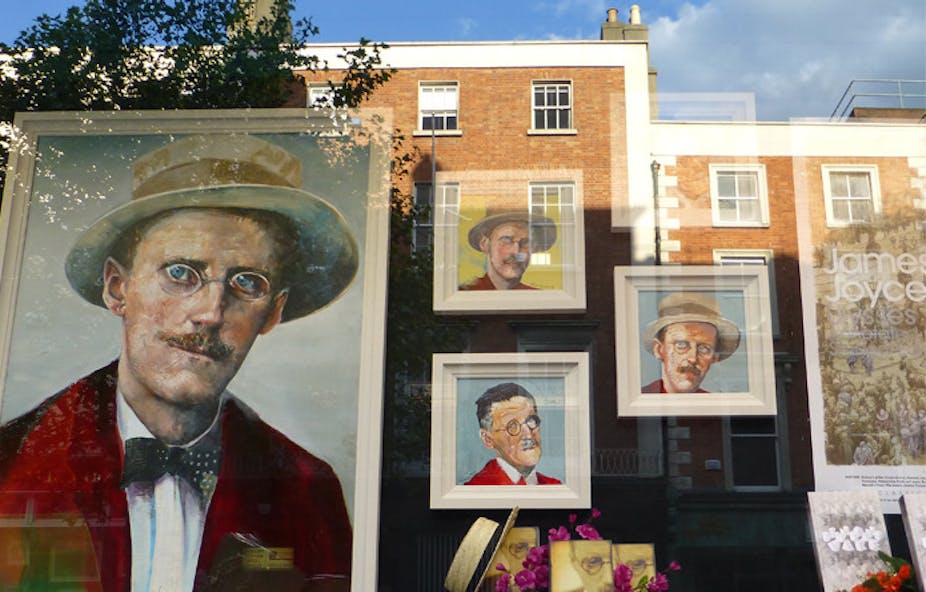Bloomsday has come around again, the day (June 16) in 1904 on which all the events of James Joyce’s great novel Ulysses unfold. 1904 was an auspicious year for Joyce. It may surprise some people to know that at this point, still only 22, he had spent as much time and energy developing his musical skills as his literary ones.
His childhood was saturated with music: his father was a noted singer and his mother a talented pianist. By the time he left University College Dublin, he was an accomplished singer. He knew most of the songs of Shakespeare’s plays, and many English folksongs collected by Cecil Sharp.
When his mother died in 1903, a year of listless dissipation followed. He met and fell in love with Nora Barnacle (their first date was on June 16). He flirted with a career in music, and she encouraged it. That spring he had rented a flat large enough to hold a rented grand piano, and borrowed money to pay for singing lessons from the best teacher in Dublin.
In May he entered the male tenor competition in the Feis Ceoil, Dublin’s annual music festival, following in the footsteps of the great John McCormack, the previous year’s champion. He also made plans to tour the south of England performing English folksongs to holidaying audiences. He placed third in the festival’s competition that year. He apparently did little to ingratiate himself with the adjudicators, refusing to sing the obligatory piece at sight.
Later in the year he and Nora departed for Trieste. He continued with vocal training there, but as his biographer Richard Ellmann writes:
Joyce’s ardour for a singing career had already begun to lapse; the tedious discipline did not suit him, and to be a second McCormack was not so attractive as to be a first Joyce.
But it is intriguing to think of Joyce going down a musical road. He certainly had the skills to be a professional musician, even though his voice was by many accounts not the most powerful of instruments. But as his life and fiction unfolded, we can see in Joyce a singer who took on the characteristics we associate with the truly authentic traditional singers of the 20th century.
Traditional singers emphasise the organic, inseparable partnership of words and music. They prioritise personal communication over spectacle, and they cultivate an awareness of the fluid nature of the boundaries between singer and audience, performance and non performance.
Expression is all, and technique secondary. Friends and critics alike were quick to notice the frailty in Joyce’s voice, but could not deny that he was in command of ineffable qualities.
It is always tempting to associate Joyce’s literary modernism with musical modernism, or at least with the type of trained singing appreciated by the bourgeoisie. But in his life and fiction, Joyce celebrated and practised a style located within intimate scenes of social life, far from the stages of professional music making.
Yes, his great story The Dead is set in a musical household dedicated to art music and formal pedagogy, and the richly musical Sirens chapter of Ulysses is alleged to have been structured on the model of the fuga per canonem. But it is easy to jump to conclusions quickly. In both these texts Joyce draws subtle connections between authentic expression and weakness.
His characters hint that starvation, age, sickness, and decrepitude are all preconditions for aesthetic success and authenticity. In The Dead, a guest professional tenor performs a song called The Lass of Aughrim, that Joyce learned in traditional style at his mother-in-law’s kitchen table. We read of the singer’s reticence and the fragility of his voice as he suffers from a cold. And that the story’s ghostly Michael Furey, remembered through a dark film of rain and snow, also had a very good voice but delicate health. It is as if, in Joyce’s imagination, these are complementary qualities.
In Ulysses’s Sirens chapter the characters remark on how starvation and poverty produce sublime vocal beauty. Bloom reflects while listening to the singers that one “must be abstemious to sing. Jenny Lind soup: stock, sage, raw eggs, half pint of cream”. And a few moments later Ben Dollard tells Simon Dedalus: “Seven days in jail on bread and water. Then you’d sing, Simon, like a garden thrush.”
What I see in the Sirens chapter is not a fugue but something more like a traditional Irish session. In the episode, songs and melodies breathe in an intertextual reality, drifting from one to the next and overlapping in Bloom’s thoughts, linked by conversation and daydreaming, just as they do during a great night of music in the pub.
So among Joyce’s many talents was his deep understanding of traditional song; not just its poetry and melody, but also its expression and its time and place. If you are celebrating Bloomsday, perhaps leave the critiques of literary modernism to others for once, and prepare a party piece in honour of one of Ireland’s great traditional singers.

